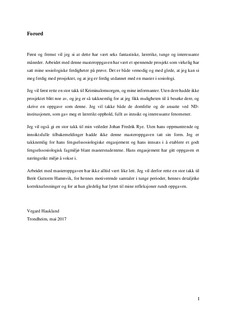Normalisering som straffeteknikk - En Casestudie av Kriminalomsorgens rusrehabiliterende straffealternativ
Master thesis
Permanent lenke
http://hdl.handle.net/11250/2560129Utgivelsesdato
2017Metadata
Vis full innførselSamlinger
Sammendrag
This master thesis is an empirical case study of a Drug-Court institution in Norway. The institution in reference, accepts convicted drug addicts who fit a certain profile, to be part of a rehabilitation program, rather than serving out their sentence in a traditional Norwegian prison.
This thesis maps the ways in which the convicted participants of the program are «normalized» within the institution, and how such a normalization can be perceived as an act of power upon the individuals consciousness and identity.
The thesis theoretical foundation limits itself to Michel Foucault’s works, as the main theoretical contributor, where the theoretical foundation of the thesis is grounded in Foucault’s definitions and understanding of power relations, institutions, discourses and the micro physics of power. As a method of analyzing the empirical data, the thesis makes use of dispositive analytics as a tool for evaluating the relationship between the discourses of normalization, and the normalizations practices.
My findings suggests that the use of dispositive analytics, as a tactic of analytical method, is a well-functioning tool for mapping out an institutions use of power, and where this power is deployed. In my empirical case study, I find that the Norwegian Drug-court system is exercising a power technique that directs and controls the convicted drug addicts’ self-consciousness. This form of power can therefore be categorized as what Foucault identifies as a hidden, corrective act of power, upon the mind rather than the body.
